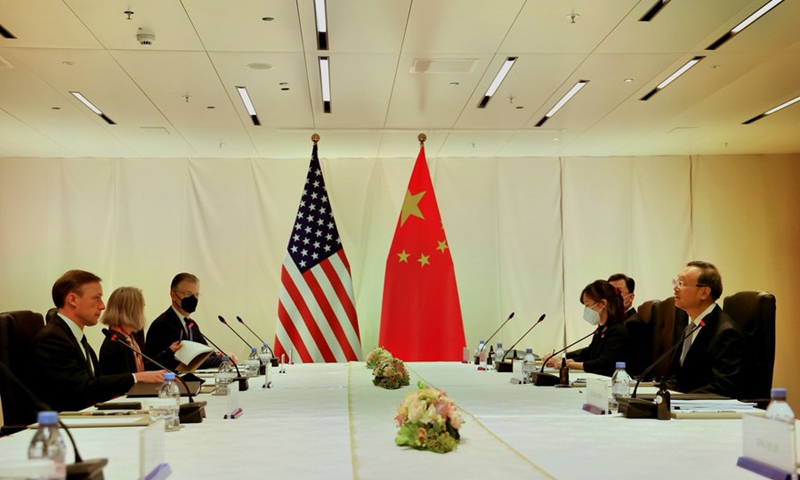Yang-Sullivan meeting showcases positive signals, major divergence
China opposes defining ties with US as ‘competitive’ despite US insistence

Yang Jiechi (1st R), a member of the Political Bureau of the Communist Party of China (CPC) Central Committee, met here Wednesday with U.S. National Security Advisor Jake Sullivan (1st L) (Photo: Xinhua)
Positive signals for improving deteriorating China-US ties and a major divergence on expectations of bilateral ties were on display at the same time during the meeting between Yang Jiechi, China's top diplomat, and US National Security Advisor Jake Sullivan. China opposed defining China-US bilateral ties as "competitive," while the US carried on with that label, analysts said, noting that China insists on seeking cooperation with the US but is also preparing for the worst.
Yang, a member of the Political Bureau of the Communist Party of China (CPC) Central Committee and director of the Office of the Foreign Affairs Commission of the CPC Central Committee, had a "comprehensive and in-depth" exchange of views on China-US relations as well as international and regional issues of common concern with Sullivan on Wednesday in Zurich, Switzerland, the Xinhua News Agency reported on Wednesday local time.
The meeting was described as constructive and conducive to enhancing mutual understanding, the report said.
The two sides agreed to take action, following the spirit of the phone call between Chinese and US heads of state in September, to strengthen strategic communication, properly manage differences, avoid confrontation and conflict, seek mutual benefit and win-win results, and work together to bring China-US relations back to the right track of sound and steady development.
The Wednesday meeting was the first face-to-face meeting between Yang and Sullivan since their exchanges in Alaska in March. It also took place half a month after a telephone conversation between Chinese President Xi Jinping and US President Joe Biden, which observers said may help break the ice of the decade-low China-US relationship following Huawei executive Meng Wanzhou's safe return home at the end of September.
Such a high-level meeting would be very helpful and timely to improve the current worrying state of the China-US ties. The meeting sends positive signals that amid the expanding frictions in every field between China and the US, the two sides can still have effective exchanges on key issues to learn each other's bottom line and to manage disputes, experts said.
The meeting showed that both China and the US are willing to enhance strategic communication, managing disputes and bringing bilateral ties back to the right track, Diao Daming, an associate professor at the Renmin University of China in Beijing, told the Global Times on Thursday.
The Yang-Sullivan meeting, which lasted six hours, achieved some positive results. It is also important to see the two sides implementing the spirit of the phone conversation between President Xi and President Biden and talking about disputes and the possibility for cooperation, Jin Canrong, associate dean of the School of International Studies at the Renmin University of China, told the Global Times on Thursday.
Under the current political situation in the US - the polarization of the Democratic and Republican parties and growing anti-China sentiment - the US' declaration on this meeting, as seen in the statement the White House released on its official website afterward, is positive, Jin said.
The atmosphere of Wednesday's meeting was better than Yang and Sullivan's last meeting in Alaska - which also saw the presence of China's State Councilor and Foreign Minister Wang Yi and US Secretary of State Antony Blinken. US media outlet CNN cited an administrative official as saying that the meeting "was far removed from the fiery public exchanges" Sullivan and Blinken had with Yang and Wang.
Experts reached by the Global Times believe that nearly 10 months after Biden took office, it appears that the US is planning to put an end to its reckless and unrealistic strategy of dealing with China "from a position of strength," and the China-US relations may enter a pragmatic and strategic stalemate stage where competition exists alongside concrete cooperation.
As Sullivan heads to Brussels and France to meet Blinken and US Trade Representative Katherine Tai, the information from the Yang-Sullivan meeting will help EU countries have more objective and balanced views on China as well as more rational and practical coordination on relations with China while the senior US officials make efforts to form anti-China cliques, analysts noted.
Despite the positive signals, differences in expectations for future bilateral ties were clear during the Yang-Sullivan meeting, Chinese experts said, citing the different focuses of the declarations on the meeting from the two countries.
Yang said during the meeting that the US side needs to have a deep understanding of the mutually beneficial nature of China-US relations and correctly understand China's domestic and foreign policies and strategic intentions. China opposes defining China-US relations as "competitive," Xinhua reported.
However, the readout of the meeting released by the White House mentioned "competition" twice, saying that Yang and Sullivan's meeting followed up Xi and Biden's phone conversation on September 9, in which "the leaders discussed the importance of maintaining open lines of communication to responsibly manage the competition" between China and the US. Sullivan also said that the US will "continue to engage with the PRC at a senior level to ensure responsible competition."
The releases showed that China and the US take a different approach in defining bilateral ties. Yang emphasized that the China-US ties should be improved as the relationship impacts the fundamental interests of the two countries as well as the world. He reiterated mutual benefit while Sullivan attached less importance to this factor, experts said.
Sullivan still stressed developing ties with US allies and strengthening self-building of the US. But China is not like the US allies or its other partners, as the US is still dividing the world by forming small cliques, which is opposite to China's stance, experts said.
Both China and the US mentioned the questions related to China's Xinjiang, Hong Kong and Taiwan in their statements.
During the meeting, Yang expounded China's solemn position on questions related to Taiwan, Hong Kong, Xinjiang, Tibet and human rights as well as on maritime issues, urging the United States to truly respect China's sovereignty, security and development interests, and stop using these issues to interfere in China's internal affairs. The US side expressed its adherence to the one-China policy, according to Xinhua.
The White House readout noted that Sullivan raised a number of issues where the US is concerned with "the PRC's actions, including actions related to human rights, Xinjiang, Hong Kong, the South China Sea, and Taiwan."
In the Chinese version, the Chinese side put this part at the end, and the majority of the release stressed the importance of implementing the guidance of top leaders and managing disputes, while the US made this part its main focus. This comparison shows China is focused on coordination and cooperation, while the US is still trying to manage bilateral ties by pushing the topics it is interested in. The differences between the two sides are obvious, experts said.
Jin said that it is unrealistic to expect the Yang-Sullivan meeting to further change China-US ties, since it has become a bipartisan consensus to have competition with China. The US has continued its previous policies toward China but also added something new - shoring up US strength, drawing up allies and enhancing conversation with China - but competing with China remains unchanged.
Although the Biden administration hasn't put in place very dramatic China policies, it has still embraced the Cold War mentality and is assembling its allies in order to contain China, Lü Xiang, a research fellow at the Chinese Academy of Social Sciences in Beijing, told the Global Times on Thursday.
China seeks cooperation with the US but is also prepared for the worst scenario if the US takes any unexpected action against China, especially on sensitive questions such as the island of Taiwan, Lü noted.
Possible meeting
Analysts also noted that the meeting in Zurich laid the foundation for a meeting of top leaders. Both releases showed a willingness to have high-level communication, experts said, noting that there is a high possibility that the top leaders of China and the US may have a virtual meeting to dismiss any misunderstanding.
Citing a senior administration official on Wednesday, US media outlet CNN said that President Biden and President Xi plan to meet virtually before the end of this year. The goal of the meeting was to improve communication between the two global giants and avoid unnecessary misunderstandings, with the thinking that "this intense competition ... really requires enhanced diplomacy."
No information has come from the Chinese side as of press time.
Lü said that aside from a meeting between the top leaders, China and the US may have more frequent exchanges in the fourth quarter of this year, considering a string of recent positive exchanges, including Meng's return, US Commerce Secretary Gina Raimondo's recent remarks and Yang's Wednesday meeting with Sullivan.
In an interview with The Wall Street Journal on September 24, Raimondo said that she would seek to improve US-China business ties.
Lü predicted that China-US talks on trade may yield some outcome this month, and high-level talks between Chinese and US militaries may also be conducted with sensitive topics such as the island of Taiwan being discussed.
Photos
Related Stories
- Chinese envoy rejects U.S. accusations at UN debate
- US urged to stop making the same errors
- Senior Chinese diplomat to meet with U.S. national security advisor
- U.S. action against IMF chief exposes anti-China hysteria: expert
- Washington should immediately stop infringing upon Chinese students' legitimate rights: Chinese embassy
Copyright © 2021 People's Daily Online. All Rights Reserved.










